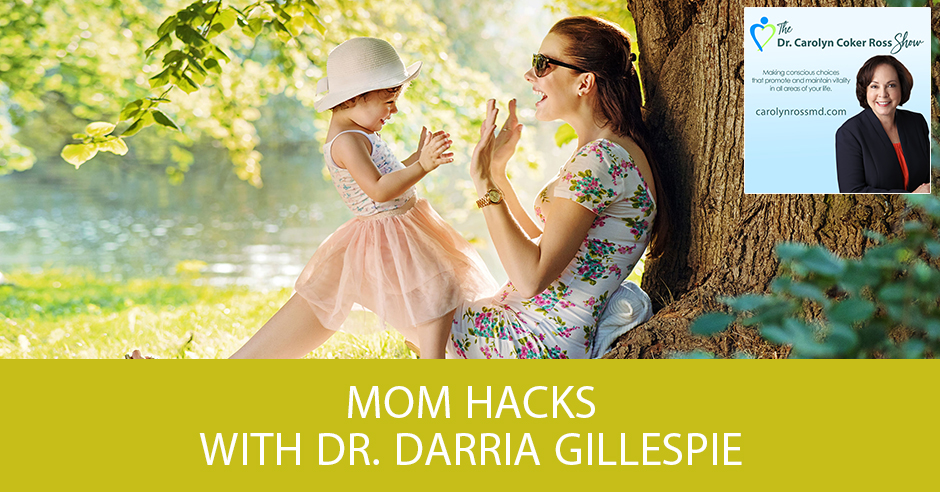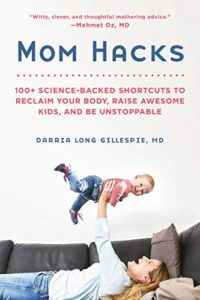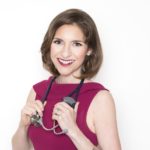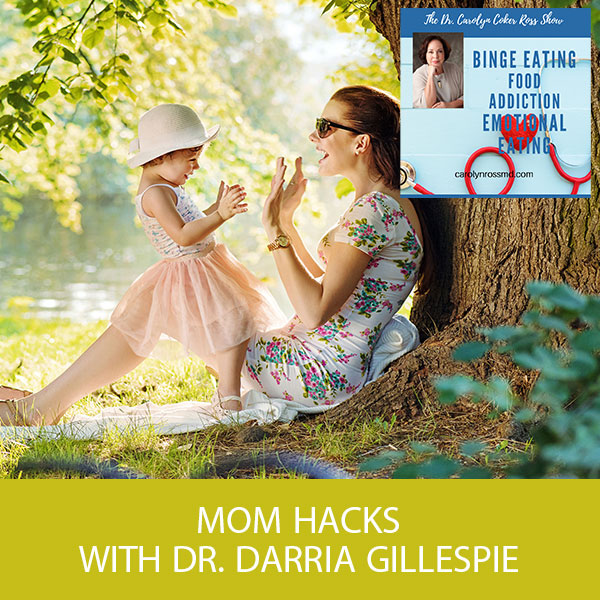
—
Listen to the podcast here:
Mom Hacks with Dr. Darria Gillespie
Scientific Hacks To Help Improve Your Life

Mom Hacks: 100+ Science-Backed Shortcuts to Reclaim Your Body, Raise Awesome Kids, and Be Unstoppable
My special guest is Dr. Darria Long Gillespie. She is a Harvard and Yale-trained emergency room doctor and a clinical assistant professor at the University of Tennessee-Erlanger in Emergency Medicine. Her ability to stay calm and take charge during chaos proved to be a valuable addition in the emergency room. Dr. Long Gillespie’s expertise on topics such as Zika, Ebola, measles, women’s health, parenting and heart health has led her to appear on CNN, HLN, The Dr. Oz Show, The Doctors and to speak regularly at health conferences across the country. We’re going to talk about her book, Mom Hacks. Welcome to the show, Darria.
Thank you so much, Carolyn. It’s an honor. It’s great to be back.
We did this before the book was released. I now have the book in hand and I’ve read it. It’s a wonderful book that will be a good resource for not just moms but people who aren’t moms, women in particular who aren’t moms, who are doing too much and burning out.
I’m glad you brought that up because the book is very universal. Most of it works for everybody, whether you’re a parent or not.
Tell me why you wrote Mom Hacks. I know you had some health challenges on your own. Was that part of the journey that led you to write the book?
It was. I started to notice as an ER doctor, I always felt that whatever comes through those doors, no matter how chaotic, I can handle it and that I’ve got this. In my own life, I became a patient. I developed autoimmune arthritis and overnight went from running several miles a day to being in so much pain. I couldn’t even stand up to see my patients. I would pull up a garbage can to sit down next to them because there weren’t enough chairs. It was such a low point. I started to realize, “I have this. I’ve got this in my work but not in my health.” I started to make major changes and turned around my arthritis. Fast forward a couple of years, I’m pregnant and I’m starting to get that same message of, “Your health as you know it is going to change when you have children. It’s out of your control. There’s nothing you can do about it,” which is the same message I got when I had arthritis, “This is out of your control. There’s a little you can do about it.” I knew I had solved it then. I figured it’s time to go back to work. How can I take those lessons I learned from my arthritis plus that mentality that lets me feel competent in my work as an ER doctor to create a system so that I and every other woman out there can in our own lives feel like I’ve got this?
That’s a radical shift, especially since as physicians and in medicine in general, patients are often told, “You have to accept this. This is the way your life is going to be.” What you’re saying is, “No, you can take back control of your life at least to the best of your ability and make needed changes that will improve the quality of your life.” Let’s talk a little bit about what you call mommy brain because I think all of us who are mothers probably know what that is but explain it a little more.
It is true. We all feel it. It’s a combination of being exhausted and having so much going on. Truly also when you become a mother, your brain structure and some of the connectivities start to alter as well. That’s why women also noticed they’re more hypervigilant, which in some of them comes across as anxiety. Others talk about this motherhood development as matrescence saying, “It’s like adolescence.” You got the hormones. You got the acne of that emotional roller coasters. You’re developing someone new. If you don’t know to expect that you can be like, “What’s happening? I’m losing my mind.” We talk about, as I say in the book, “This is normal.” Know to accept it and love the woman who starts to appear.
What’s the difference though between baby blues and postpartum depression? Because many women suffer from postpartum depression and think that it is that normal baby blues that occurs right after birth.
I’m glad you mentioned that because they say that approximately 80% of women suffer from baby blues, which makes me wonder about the other 20%, to be honest. I wonder if they were too sleepy to answer the question, but then somewhere between 8% to 15% of that suffered from postpartum depression. It’s important to know the difference. Baby blues means that occasionally on days you may feel more emotional. You may have some mood swings, anxiety, irritability. They pop up and then they go away. They’re not constant. Postpartum depression is a much more depressed mood. It lasts almost constantly. It’s on most days. Again, I say these definitions as if they are black and white. It’s important to all of the moms know that even if they’re feeling baby blues, I’d like them to talk to their doctor about it. I know a lot of moms who said, “I didn’t meet the questions for postpartum depression.” I said, “No, I didn’t feel that to my ob-gyn.” I was like, “If you feel remotely that way, talk to them, talk to somebody.” It’s important, especially for postpartum depression. If you don’t get treatment for it, the symptoms can last to a year or more.
They can be pretty dark. I had postpartum depression with my third pregnancy. I was surprised at how severe it is. It changes your thoughts.
It truly does. It has nothing to do with anything you did and good, bad mom, motherhood, nothing. It’s why I tell everybody I’m like, “This is me asking you. If nobody else asks you, I am implicitly asking you and then please go seek out some help.”
[bctt tweet=”Motherhood doesn’t have to come at the expense of your health. You can be the mother and woman you want to be!” username=”CarolynCRossMD”]There is help. There is something that can be done about it. It’s not hopeless.
There are many things that don’t even require medications. Some women are afraid of going on medications. There are a lot of other things to help with PPD as well.
What I liked about your book is some of the practical hacks you offered for nutrition, for example. Can you say why you felt nutrition was so important to include in here? What are some of the hacks that you’ve put in there?
There are four sections in the book. There’s nutrition, exercise, sleep and resilience, which is also stress management. For each of them, all of the hacks, since I’m an ER doctor, you’re a physician yourself. They had to be totally science backed. Since I’m in the ER, I’m obsessed with time savings. It was like science meets the littlest smallest effort you can make for the biggest change. Nutrition is so important because we know that what we eat impacts our health overall. It impacts our weight. Also, it impacts our mental health. Many studies are showing that the Western diet significantly increases your risk of depression. As I’m sure you yourself know, this is nothing new to you, it increase the risk of depression by up to 40% over a Mediterranean diet. I wanted to start with that and make sure that was in there, to include nutrition.
Give us an example of an attrition hack and why is it important to hack nutrition too?
If you look at how our caveman ancestors evolved, fat, sugar and salt were scarce. They didn’t need the willpower to avoid them. They weren’t there. They craved them. It was okay when they saw fat, sugar and salt. You could never find straight up sugar unless you found honey or maple syrup. There was no straight up sugar. That’s the way our bodies evolved for thousands of years. Suddenly in the last 100 years, we are able to get sugar straight up. We are able to get food to this combination of sugar, salt and fat. That’s against a body that we don’t have strong willpower to fight it. If all day long you are challenged with cookies, donuts, sweet Kettle Corn, Pop Butter Chips, your brain gets exhausted, you can’t refuse it. You can know better refuse that then if I said, “Here’s $10 million, hold your breath underwater for fifteen minutes.”

Mom Hacks: Our brains are naturally wired to look for the negative. That’s a survival feature from our caveman ancestors.
You can’t do it. It doesn’t matter how much you want to. I created hacks, especially for nutrition to say, “What are ways that I can change my environment, change other things so that I’m not even challenging my willpower?” That’s what we see, people who we think have better willpower and lose more weight. It’s not that they had more willpower, it’s that they changed the situation. They were tempted less. A couple of examples. There are some hacks in the book that is tactile. You can do those right now and some are more conceptual. This is a tactile one. I want everybody to do a little pantry intervention. Maybe it’s a little KonMari of your pantry for your health. For instance, everybody in behavioral sciences uses M&M’s as testing so I don’t know what that says about M&M’s.
If they are right next to you versus if the M&M’s are six feet away such that you have to stand up out of your chair to go get them or if they are up on a shelf such that you have to pull a stool over, even if the stool is right there, you eat 70% less and people reported no additional cravings. We like to think we are very intentional and very deliberate. It’s monkey see, monkey eat and monkey no see, monkey no eat. Google had another one, a similar example. They give away free food to their employees. They were eating too many M&M’s. They took the M&M’s. They did not want to tell them not to eat it. They took the M&Ms and they put them in opaque containers. They put dried fruit and nuts and other healthier foods in clear containers. Over the next seven weeks, their 2,000 employees ate three million fewer calories of M&M’s. It’s those little changes.
It goes against that notion that we have to use willpower because that’s something that everybody thinks, “If I had more willpower.” I love the fact that you’re giving concrete things that work. I wanted to talk a little bit more about resilience. You say that’s partly to do with stress. Is resilience a trait that we’re born with or is it something that we can develop or strengthen?
I am so glad you asked this because if you had asked somebody twenty years ago, they probably would’ve said resilience, happiness, how you handle stress. All of those are based on your genetics and how you grow up. There’s not much you can do. The brain doesn’t change. We are learning that that is not the case. There’s neuroplasticity, which means the plasticity, the bendability and changeability of our brains. There are a number of things we can do that I learned in this research that I am doing my own life as well that make a massive difference. A couple of examples, number one, we hear a lot about gratitude. Be grateful. People who are grateful or happy. I had heard that and I didn’t think too much about it. I started to see some studies, some out of Harvard and different places. They found that our brains are naturally wired to look for the negative. That’s a survival feature from our caveman ancestors when that shadow would probably mean it could be a tiger or a feuding warlord or somebody who is out to get us. Our brains look for the negative. They remember the negative.
One way to change that and one of the very few tools that we know can truly change your happiness set point because we have a little set point is gratitude. One way to do that is every night, write down three new things for which you’re grateful. They have to be new because here’s what your brain starts to do. It starts to rewire every day. Instead of seeing the negative, remembering the negative, your brain literally starts to look for the positive because it’s looking for things to populate that list at night. In 21 days, they were able to take people from being more pessimistic to make them optimistic, just doing this for three weeks. That was astounding because I never knew the science behind it and how powerful that was.
It’s such a short period of time to get that. You also talk about meditation. What’s the place of meditation with resilience?
[bctt tweet=”Nutrition is so important because we know that what we eat impacts our health overall.” username=”CarolynCRossMD”]Meditation is another one of those where they have found that it changes the brain. MIT was studying monks like from the Dalai Lama’s team and all, which is amazing. They are looking at what their brains look like. I can never hope that my brain is going to look like a monk’s brain. What the study showed is they even looked at people like me and possibly you, I don’t know if you meditate at all. People who did it like novices, they found that after doing it for about an eight-week habit when they looked at their brain. The amygdala is our anger, our fight portion of our brain. The size of their amygdala had decreased.
Which means they were more able to manage stress and less emotionally reactive.
That monster bear jumped out that we have when we start to get stressed or upset, which was fascinating especially in people who are not going and spending a year in an Ashram. They are doing a meditation practice once a day, like you and me.
Was there any period of time that they meditated?
I believe they did a slightly longer one. I think theirs was between 30 minutes to an hour. It’s a little bit longer. I don’t meditate for that long. I usually do fifteen minutes. I have some Deepak Chopra meditations that I love and Gabrielle Bernstein. I like both of them. I’ll often pull them up. There are also a lot of apps: Headspace, Calm that people can do and try it. It’s amazing. It’s funny now that I started doing it more regularly. I can tell if I’ve missed a couple of meditation sessions like, “I got to get back. This is getting bad. I need to start doing that again.” It’s an ongoing thing. I used to think, “It’s a meditation practice. That’s so much work. I’m not a person who meditates.” All of us can do that. You can incorporate prayer and your religion as well, five, ten minutes even, you’ll notice it makes a difference.
I know that Catholics had the centering prayer. That’s a practice that’s very meditative. I think most religious traditions have some meditative practice involved. It doesn’t take much. Even if you start with ten minutes, maybe that takes longer than eight weeks. Even ten minutes a day can help you feel better.
I have on that as well as mindfulness. I don’t know, do you practice any mindfulness exercises yourself, Carolyn? You struck me as somebody who is very mindful.
Thank you. Yes, I do practice a lot of mindfulness. I did do transcendental meditation when I was in medical school because medical school is an extremely stressful experience. I credit TM for getting me through medical school because it kept me from going off the rails.
I’ve been wanting to try TM. I was talking to Sanjiv Chopra, who’s Deepak Chopra’s brother. Sanjiv was trying to get me to do some transcendental. I’m like, “I will. I want to. I’ve got to get the book done.” He’s like, “You can get the book done faster if you’re doing transcendental meditation.” I’m like “Sanjiv, I get it.” Also, the mindfulness in general too, on those times when I’m out walking with my children and maybe don’t have exactly the time to meditate, to be mindful and to have what I call phone-free time. Whether it’s going to the bathroom because let’s be honest, everybody pulls out their phone in the bathroom or you’re standing in line at the grocery store. All of those places we start to pull out our phone.
What did we do before we had phones?
We had to talk to people. I take that time. I intentionally and deliberately do not pull out my phone or if I’m interacting with my children, I put away the phone. The phone is away. I don’t look at it. If it rings, I answer it. Usually, that’s going to be a family member or something. I intentionally do that because otherwise, we’re constantly bombarding our brain with more little facts and little things to be thinking about taking us out of the present moment, which increases our stress levels and increases the distraction habit of our brain. Phone-free time every day, even if it’s two or three minutes, keep it in the purse or keep it aside.
That’s what’s called presence. Eckhart Tolle talks about being in the now. It’s something that we’re losing in our society, but I love the fact that we’re combining the digital world with mindfulness through some of the apps. You mentioned Calm, which I like and has different exercises that you can do. There are so many others. If you want to use your phone, at least take it out and do some of those breathing exercises. Listen to calming music for five minutes to get yourself off the ceiling. Let’s shift to talking a little bit about exhaustion. I know that’s something that as a mom most of us have dealt with. Also, in the busy overworking world that we live in, many people are dealing with exhaustion and even burnout. What are the hacks for that?
[bctt tweet=”Be grateful. People who are grateful are happy.” username=”CarolynCRossMD”]That’s initially why I wanted to write this book because I was struggling with that. It showed itself in terms of my arthritis. It happened when I was in the middle of residency working 36-hour shifts. I do find that when my sleep is off, working overnight shift or something, my arthritis flares up. I think that was my body’s saying, “You’re not paying attention to how bad you feel. We’re going to physically make you feel and notice this.” That was a sign from my body. A couple of different things, there is a whole section on getting sleep, which is additionally a challenge for women in general. Women, in general, suffer more from insomnia than men. I talk about two factors for moms.
There is how to get your kids to sleep because even if you’re ready to sleep if your munchkin is wide awake, you’re not going to be sleeping. There’s a lot in there about getting your children to sleep. There’s a lot in there about helping you sleep and that includes things like getting our circadian rhythm back on track. For so many of us, our body clock is whiplashed because we’d get up at different times every day. We’re watching Netflix until midnight. Our body clock does not know what time it is. That feels bad. It feels like we have low energy. It also impacts our health. A study out of Harvard showed that it took a group of people and for nine days all they did was mess with their sleep. They woke them up at 10:00 PM and 2:00 AM and different things. After nine days, they all had an increase in inflammatory markers, an increase in cholesterol and blood pressure. A third of them would have tested positive for pre-diabetes from sleep alone.
Also, weight because women are more interested in their weight than almost anything else.
Studies show that if you take two groups of women who had the exact same caloric intake if one of them has higher chronic stress, that group has higher, larger waist circumference. There is some connection. We know bits and pieces of it. We don’t have the full picture of high stress that causes us to crave even more high sugar, salt and fat foods, which then progressively gets stored in our belly, particularly in their abdominal fats. That’s an extra spare tire. There’s a lot about stress in there. Another thing for moms and women, in general, is the multitasking. We talked a little bit about it. Multitasking truly contributes to this exhaustion and this sense of distraction. We think we’re good at multitasking especially as physicians and as ER doctors. Studies show that it doubles your rate of error and cuts your productivity by 40%. I tell people to single task, focus on one task for 5, 10, 30 minutes, whatever it is. You’ll do it more quickly and efficiently. It frees your brain a little bit because that is the problem. Our brains are being bombarded too much. How can you take off some of the workloads from them?
I wanted to end up talking about something fun. You and your book talk about exercise personality. What is that?

Mom Hacks: For so many of us, our body clock is whiplashed because we’d get up at different times every day.
Remember I told you when I was doing research for this, I was like, “What are the easiest ways, the best like scientific shortcuts that I can find to help make it easier for people to exercise?” I came across some studies that showed that using your Myers-Briggs personality type, they can predict what exercises you will stick with better. That was fascinating that you could predict that. There’s a whole table in the book or if you’re extroverted or if you’re the creative type or what you can do, and which exercises predict what you’ll stick with most because what we know and what I tell people if you hate to run, please don’t run. Please do not get on the treadmill. I don’t want you to, because if you’re miserable, maybe I can get you to exercise for three weeks, but in the end, you’re not going to keep doing it. That does you no good. That doesn’t mean I’ve done my job. I tell people, go to this table. Some people will be surprised. People who are a creative type tend to thrive more in outdoor exercise settings. While those who are more intuition-driven, need more variability and a little bit of high risk. People who are more intuition type tend to get bored with exercise. Know what’s going to happen. Maybe those people should have a class pass or something so they can try different classes. It’s amazing. How can you work with your body?
It’s a great notion to be able to work with your body instead of trying to whip your body into shape.
That’s what the hacks fall into categories. How can I work with my body cycles, but no decisions are necessary or how can I change my environment to make the automatic decision, the unconscious one, the healthy one? I freed up brain space for the third category, which is helping you be intentional with how you’re using your attention.
The bottom line is when you change behaviors, the most important thing is to be able to sustain and maintain those behavior changes. If you work with your body, you’re more likely, as you’re saying in the book, to be able to keep it going rather than going on these big diet pushes or exercise pushes that don’t work for you.
They fail and then you feel bad as if you’re the failure. It’s like, “No, you’re not the problem. You followed some trendy piece of expert advice that wasn’t an expert. It was setting yourself up for failure.” That’s why I want them to start small because if you start small enough, you can achieve it. You feel good. You can pick up other hacks. I want people to start with one hack to do that. Feel good. Let me know how they do. I can cheer them on. I love cheering people on. You get that self-acknowledgment and self-reinforcement, “I can do this and I’ve got this.” You go for further.
Thanks so much for being back on the show. Dr. Darria’s book is called Mom Hacks: 100+ Science-Backed Shortcuts to Reclaim Your Body, Raise Awesome Kids and Be Unstoppable. I want to say, having read the book that it’s a great book for everybody. You don’t have to be a mom to benefit from her hacks.
On that, it’s right now ranking one of the top best sellers in women’s health, general women’s health. Anybody reading if we can keep it up there, I’m excited about that.
[bctt tweet=”Multitasking truly contributes to exhaustion and this sense of distraction.” username=”CarolynCRossMD”]Go get Mom Hacks and start hacking your own life and tell us more about how people can reach you or learn more about you.
The easy thing is I’m @DrDarria. That’s on Instagram, Facebook, Twitter and even my website is DrDarria.com. I love to hear from people. I love to know what they’re working on and what hacks worked for them or what they want hacks on that I can go try to find a solution for them.
For your next book. Darria, it’s so great to have you on. I appreciate your coming back.
Thank you, Carolyn.
Important Links:
- Dr. Darria Long Gillespie
- Twitter – @DrDarria
- Instagram – Dr. Darria
- Facebook – Dr. Darria
- Mom Hacks: 100+ Science-Backed Shortcuts to Reclaim Your Body, Raise Awesome Kids, and Be Unstoppable
- https://DrDarria.com/
About Dr. Darria Long Gillespie
 Dr. Darria Long Gillespie is a Harvard & Yale-trained ER doctor on faculty at the University of Tennessee – Erlanger Hospital Emergency Medicine.
Dr. Darria Long Gillespie is a Harvard & Yale-trained ER doctor on faculty at the University of Tennessee – Erlanger Hospital Emergency Medicine.
Her ability to stay calm and take charge during chaos proved her to be a valuable addition in the ER. Dr. Long Gillespie’s expertise on topics such as Zika, Ebola, measles, women’s health, parenting, and heart health has led her to appear on CNN, HLN, The Dr. Oz Show, The Doctors and to speak regularly at health conferences across the country. Her first book, Mom Hacks, is due out February 2019.








